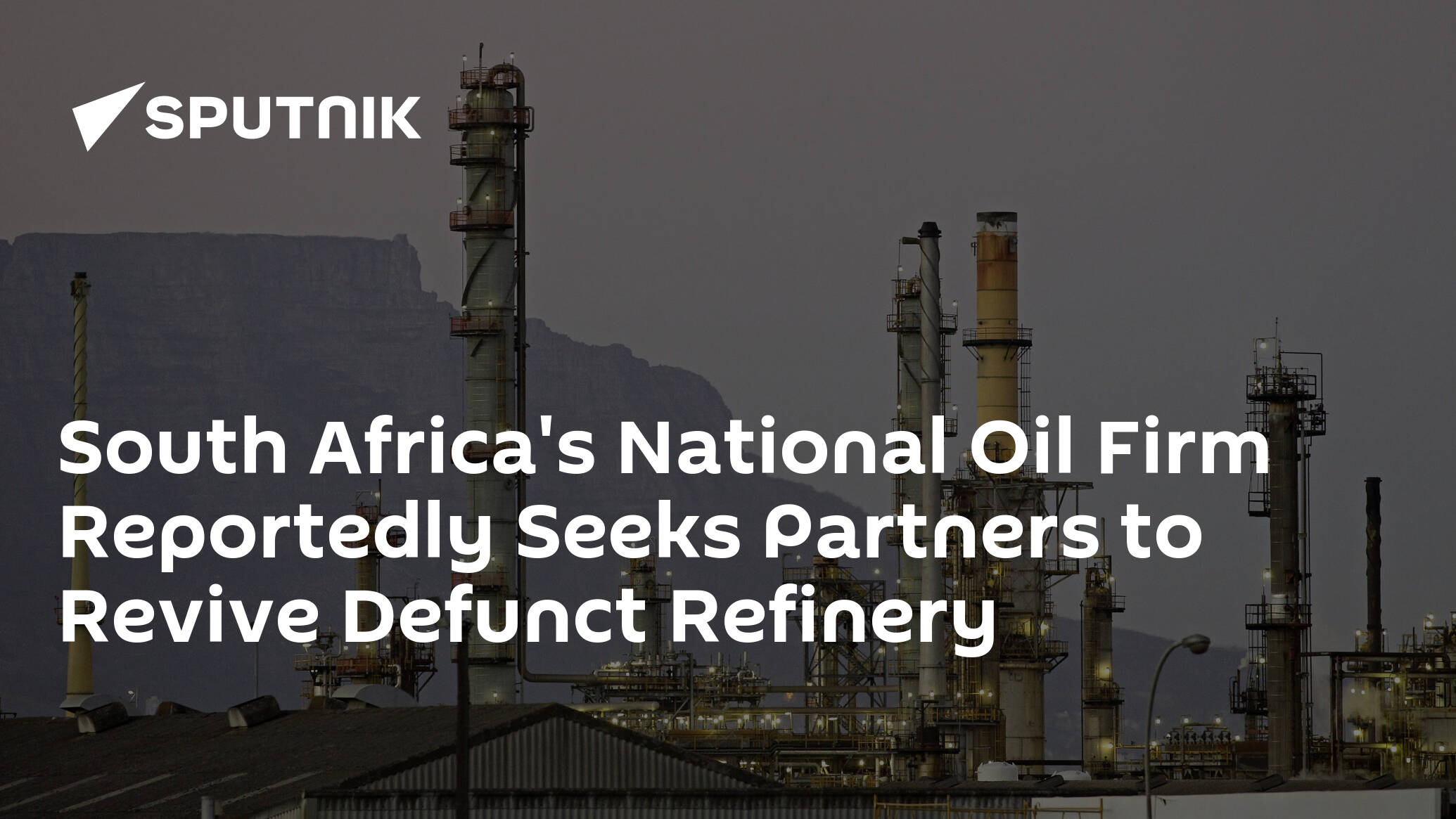https://sputniknews.com/20230202/south-africas-national-oil-firm-reportedly-seeks-partners-to-revive-defunct-refinery-1106922115.html
South Africa’s National Oil Firm Reportedly Seeks Partners to Revive Defunct Refinery
South Africa’s National Oil Firm Reportedly Seeks Partners to Revive Defunct Refinery
PetroSA has issued a proposal request outlining several development scenarios. In the best of the projected cases, the firm could turn its now-defunct refinery at Mossel Bay into a major supplier of fuel in the country.
2023-02-02T12:43+0000
2023-02-02T12:43+0000
2023-02-02T12:43+0000
africa
southern africa
south africa
oil refinery
oil
fuel
fossil fuels
/html/head/meta[@name=’og:title’]/@content
/html/head/meta[@name=’og:description’]/@content
https://cdnn1.img.sputniknews.com/img/07e6/0b/13/1104439898_0:46:3000:1734_1920x0_80_0_0_09a6d17f4b8d5fb483f2995ea7fed51e.jpg
PetroSA has appealed to commercial partners to help fund several development projects, media has reported. In one of the cases, the South African national oil company could turn its now-defunct refinery at Mossel Bay into a major supplier of fuel, able to supply petrol and diesel for around a third of South Africa’s cars.According to the company, the refinery could compete with the output of chemical company Sasol, which is among the last local producers of liquid fuels left against the backdrop of refineries shutdowns.PetroSA alleges that Mossel Bay, which was constructed for a 36,000 bpd output, could produce 200,000 bpd with the right investment. With less capital investment, the projected output is 7,500 bpc, covering only 1% of South Africa’s daily needs.There are several criteria for potential partners in the appeal, including state-owned, or “state supported”, oil or gas providers and investors. However, any partner that could bring at least $2.5 million to the table, or raise $150 million over time, is welcome.The appeal also prioritizes those who could launch cooperation this year. The company considers entering into a profit-sharing or contract-production deal or handing over equity to a partner.In the 1980s, apartheid-era South Africa made efforts to achieve independence in its fuel supply against a backdrop of imports threatened by sanctions. The Mossel Bay refinery was put into operation in 1992, two years before the fall of apartheid. Since the lifting of sanctions and the re-activation of imports, the facility had been declining until being mothballed in 2020.South Africa – facing electricity blackouts since 2007 – is seeking to modernize its energy sector. The country’s energy roadmap involves the utilization of major offshore gas fields to cover energy needs – despite the global trend of switching to “greener” energy from fossil fuels and the accompanying international pressure.
https://sputniknews.com/20230122/south-africa-lowers-local-content-requirements-to-mitigate-energy-crisis-1106573644.html
africa
southern africa
south africa
Sputnik International
feedback@sputniknews.com
+74956456601
MIA „Rosiya Segodnya“
2023
News
en_EN
Sputnik International
feedback@sputniknews.com
+74956456601
MIA „Rosiya Segodnya“
Sputnik International
feedback@sputniknews.com
+74956456601
MIA „Rosiya Segodnya“
petro sa mossel, mossel refinery, south africa oil, south africa fuel, south africa energy, africa oil, africa gas, africa refinery, africa oil facilities
petro sa mossel, mossel refinery, south africa oil, south africa fuel, south africa energy, africa oil, africa gas, africa refinery, africa oil facilities
The continent’s most industrialized country with an estimated 60.6 million people consumes approximately 600,000 barrels of fuel (bpd) per day.
PetroSA has appealed to commercial partners to help fund several development projects, media has reported.
In one of the cases, the South African national oil company could turn its now-defunct refinery at Mossel Bay into a major supplier of fuel, able to supply petrol and diesel for around a third of South Africa’s cars.
According to the company, the refinery could compete with the output of chemical company Sasol, which is among the last local producers of liquid fuels left against the backdrop of refineries shutdowns.
PetroSA alleges that Mossel Bay, which was constructed for a 36,000 bpd output, could produce 200,000 bpd with the right investment. With less capital investment, the projected output is 7,500 bpc, covering only 1% of South Africa’s daily needs.
There are several criteria for potential partners in the appeal, including state-owned, or “state supported”, oil or gas providers and investors. However, any partner that could bring at least $2.5 million to the table, or raise $150 million over time, is welcome.
The appeal also prioritizes those who could launch cooperation this year. The company considers entering into a profit-sharing or contract-production deal or handing over equity to a partner.
In the 1980s, apartheid-era South Africa made efforts to achieve independence in its fuel supply against a backdrop of imports threatened by sanctions. The Mossel Bay refinery was put into operation in 1992, two years before the fall of apartheid. Since the lifting of sanctions and the re-activation of imports, the facility had been declining until being mothballed in 2020.
“Additional reserves have been brought into production since the original commissioning of the facilities in the 1990’s, but these have now largely been depleted over the years of operation, and without further development of indigenous gas production or alternative feedstock strategies, the facility has run out of gas feed,” PetroSA declared.
South Africa – facing electricity blackouts since 2007 – is seeking to modernize its energy sector. The country’s energy roadmap involves the utilization of major offshore gas fields to cover energy needs – despite the global trend of switching to “greener” energy from fossil fuels and the accompanying international pressure.


